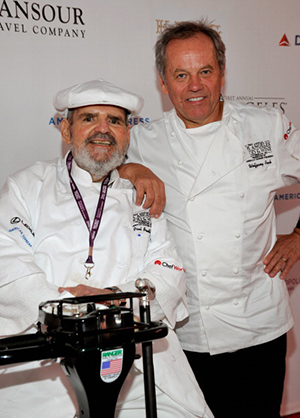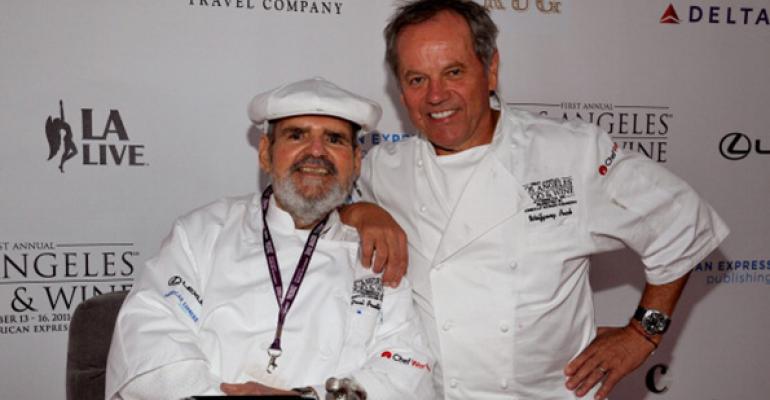 This post is part of the Food Writer’s Diary blog.
This post is part of the Food Writer’s Diary blog.
I once got to interview Paul Prudhomme, the legendary chef who passed away today. It wasn’t like many of the interviews I have time for these days — a quick phone chat about what the chef’s doing with dim sum service or what frying oils she likes.
I met Prudhomme for coffee in the restaurant of the Midtown Manhattan hotel where he was staying. He put equal amounts of Equal and Sweet'n Low in his drink — this was in 2000, pre-Splenda, let alone Stevia — and I sat down with my cassette recorder and learned a lot about the man who helped redefine food in America, and what it meant to be a chef.
He wasn’t completely Cajun
Although Prudhomme helped introduce Cajun cuisine to the world, he wasn’t completely Cajun himself. His mother's side of the family was Cajun, but his father’s side actually arrived in Louisiana directly from France, not from the Canadian Maritime provinces where the Cajuns came from (the Maritimes were called Acadia at the time, which is where the name Cajun comes from). Louisiana was still Spanish territory when his father’s family arrived.
“We have the documents from when the Spanish king gave our family a 50,000-acre land grant,” he told me. "That was in 1763.”
Auspicious beginnings, but by the time Paul Prudhomme came on the scene in 1940, he was the 13th child in a family of sharecroppers.
“We had nothing,” he said.
He didn’t start out as an awesome businessman
Prudhomme tried his hand at entrepreneurship early on. He’d never eaten in a sit-down restaurant, but his family’s fortunes had improved enough to go to drive-in restaurants from time to time. They enchanted him, and with the help of a local merchant, he opened his own drive-in restaurant at the age of 17. It failed in 10 months.
He opened three more restaurants, one after the other.
“The next three in a row failed. In a row. I had four of them fail in a row. That was my beginning,” he said.
He then hit the road and started working in other people’s restaurants across the country.
He first started adding spices to his food in Denver
We chatted over the course of the interview. The language got salty, as it does when chefs start to talk, and we started to have a conversation rather than just an interview. Conversations make for the best interviews, anyway, and I mentioned that my hometown was Denver.
That, it turns out, is where Prudhomme started adding spices to his food. Unbeknownst to his chef, he would surreptitiously slip cayenne pepper and other Cajun spices into the food. He figured it would taste better that way.

His drive to use fresh ingredients came from his love for his mother’s potatoes
As a young boy, Prudhomme would help his mother in the kitchen, including fetching vegetables from their garden. He tried to reproduce them in a restaurant where he was working.
As he told me: “I was cooking at the Elkhorn Lodge in Estes Park, Colo., and I bought little red potatoes. I was very excited because I love them. I think they’re so creamy and delicious and wonderful.
“Within an hour I cooked a batch of them, and I didn't like them. I tried putting butter with them. I tried all kinds of seasoning. I still didn’t get it. So I decided to go back to a day in my life with Mom because when I helped her do these potatoes, they were wonderful. I wanted to see what she had done to them. And the most phenomenal thing happened; it changed my life. I remembered that the first thing we did was we went out into the field, and we dug them up.
“I recognized at that point how important it is to have fresh ingredients, and I’ve been battling that battle ever since.”
And to a large extent, he has won that battle. We have a long way to go, but use of local ingredients is the cost of entry for independent restaurants, and, increasingly, for chains. For example, at the new Chick-fil-A restaurant in New York City, the produce for the salads all comes from New York and New Jersey. Local doesn’t always mean fresh, but it can help.
He liked parties
Paul Prudhomme frequently made appearances at Nation’s Restaurant News events, particularly our annual MenuMasters party (he was inducted into the MenuMasters Hall of fame in 2003, and in NRN’s Fine Dining Hall of Fame in 2000). Just by showing up he gave added substance to the events, because everyone there knew that he changed the way America eats, and how we think of chefs, for the better.
Contact Bret Thorn at [email protected].
Follow him on Twitter: @foodwriterdiary

